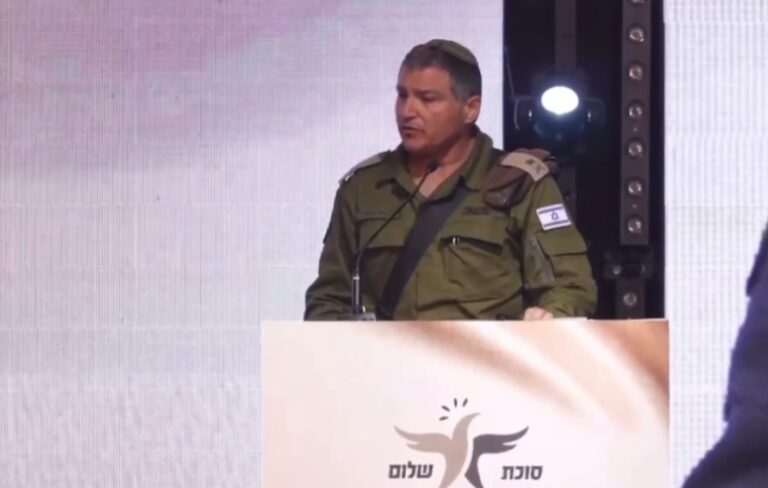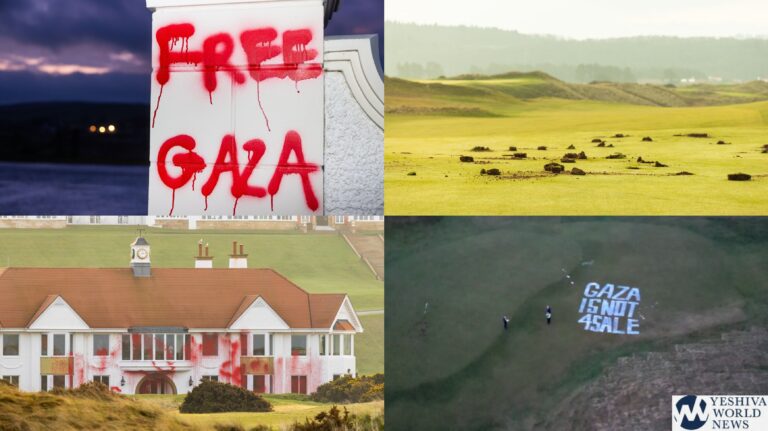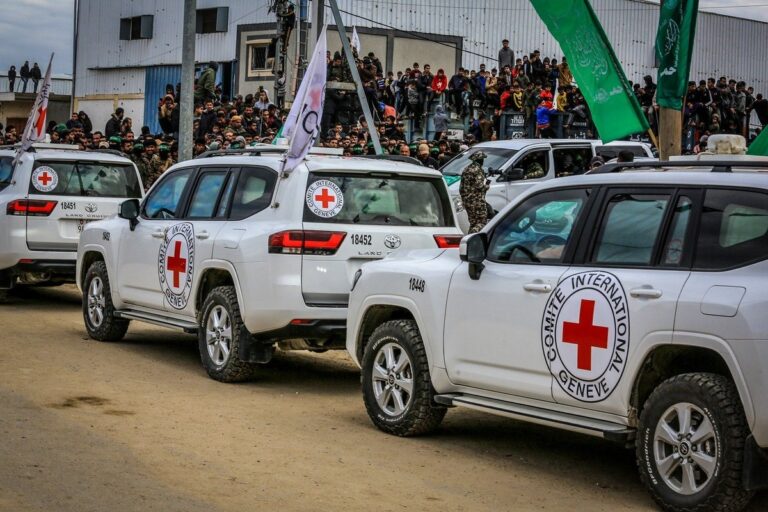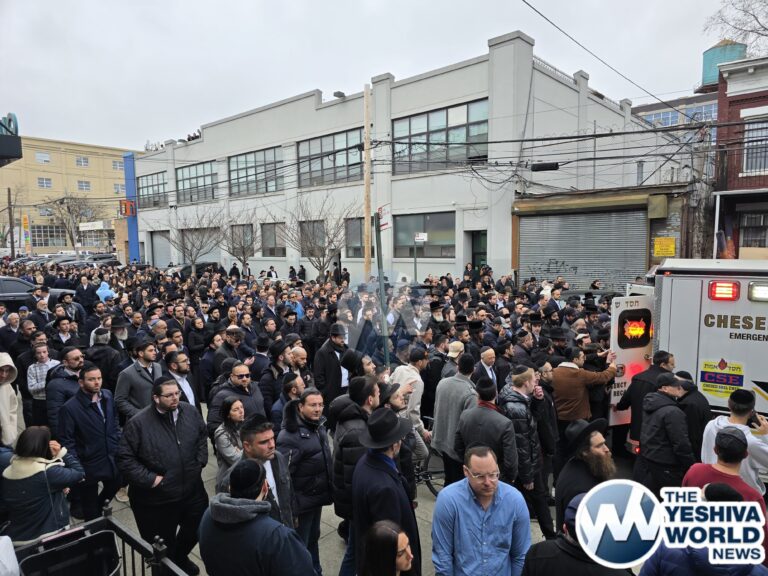 Both Israel and the United States have shifted gears, preoccupied with elections. While Iran is still a media item, it has been shifted into the context of an election issue rather than the imminent threat it was a few weeks ago. Syria was never a real item, and the events beginning to boil over in Lebanon are off the radar. The presidential candidates in the United States have had their televised debates and the issues have been discussed. It’s now up to voters.
Both Israel and the United States have shifted gears, preoccupied with elections. While Iran is still a media item, it has been shifted into the context of an election issue rather than the imminent threat it was a few weeks ago. Syria was never a real item, and the events beginning to boil over in Lebanon are off the radar. The presidential candidates in the United States have had their televised debates and the issues have been discussed. It’s now up to voters.
In Israel, political leaders are preoccupied with establishing an election team, campaign strategy, hiring strategists, spokespersons and other election officials. While the prime minister, defense minister and other senior cabinet personnel continue monitoring Iran and other regional activity, the focus has shifted and this is the reality of the Knesset voting to dissolve itself, marking the beginning of the election campaign. The national election has been set for 11 Shevat 5773, about three months from today and while politicians would like nothing more than being permitted to concentrate on the election, terrorists in the region have other plans.
On Wednesday morning (8 Cheshvan) over 50 rockets and mortar shells were fired into southern Israel in a period of a few short hours beginning during the predawn hours and ending at about 8:00am. The air force responded with the usual quid-pro-quo sorties but it is becoming clearer by the moment that a ground forces incursion into Gaza is a matter of time. According to most, Operation Cast Lead was a success but the troop withdrawal was premature and today we are paying the price.
REGIONAL CONFLICT SHOULD RAISE EYEBROWS [BUT DOESN’T]
The regional conflict seen in Syria and Lebanon is not just “their issue” but it has a direct impact on the situation in Israel, as thousands gathered in Lebanon for the Beirut funeral of Lebanese Chief of Military Intelligence Wissam al-Hassan, who was killed in a bombing attack last week. In Lebanon, the attack is viewed as the work of Syria.
In essence, the bombing attack in E. Beirut on October 19, 2012 that claimed the life of the Lebanese brigadier-general, a political nemesis of Damascus, may have crossed a red line, clearly showing the Syrian civil war has now moved into neighboring Lebanon.
Syrian leaders being who they are don’t generally beat around the bush when it comes to Israel, and during the 18-month civil war in that country senior officials have stated loud and clear that if they are at war, Israel will ultimately pay the price. One example of this would be Rami Makhlouf, a close confidant of Syrian leader Bashar al-Assad, who stated at the outset of the uprising that “If we do not have stability, there will be no stability in Israel”. Israel’s intelligence community is no stranger to the hashkafa of its enemies and officials in Jerusalem are aware that if the Syrian regime feels its demise is imminent, Assad may launch an attack against Israel as a final act of Arab heroism. This is among the reasons Prime Minister Binyamin Netanyahu is so concerned regarding Syria’s stockpile of chemical weapons. Another major concern is the chemical weaponry falling into the hands of Hizbullah or other terrorists.
What is critical for Western leaders to understand is the bomb that claimed the life of the senior Lebanese official signals the willingness of the so-called ‘axis of evil’, Iran, Hizbullah and Syria to take the fighting to any venue towards realizing its goals and snuffing out the enemy. There is virtually no consideration regarding the ramifications of crossing international borders, least of all Lebanon, which has been a puppet of Syria and Hizbullah. Once considered the French Riviera of the Mideast, Lebanon today is known for its instability as well as serving as Hizbullah’s base.
By the way, Lebanon has accepted a FBI offer to send an investigatory team to assist in apprehending those responsible for the fatal attack. This will also permit American intelligence officials to take a close look at the real picture.
THE WHITE HOUSE MUST SEE THE BIGGER PICTURE
For the United States, the bomb attack should have a bigger message, one that says this is the Mideast and here the rules of engagement are different. Western etiquette as perceived in the Mideast is not noble, but interpreted as weakness, and the message here is Iran will take the economic blows but it will march forward and continue developing its atomic bomb. Nothing has been learned from the assassination of Lebanese Prime Minister Rafiq Hariri.
Just this week Iranian President Mahmoud Ahmadinejad announced he will soon revert to ‘Plan B, admitting that while the economic sanctions have had an impact, it was expected and he is ready. He is threatening to turn the tables by shutting off the oil pipeline, leaving Western nations high and dry. He claims to have another source of income and he now plans to turn the sanctions against the very countries trying to pressure Tehran. Once again, this is the Mideast and it is about Islamic pride and power, having nothing to do with logic, income or a responsibility to the international community.
As the late Prime Minister Golda Meir once stated, peace will come when they
“love their children more than they hate us”, referring to Israel’s neighbors. This does not appear to likely any time soon.
PRESIDENT OBAMA RESTRAINS TURKEY
In an effort to prevent regional escalation of warfare, US President Barak Obama warned Turkish Prime Minister Recep Tayyip Erdogan and his chief of staff regarding cross-border military activity against Syria as those two nations escalate to a full blown military conflict. The White House wished to make its position quite clear, dispatching the Chairman of the Joint Chiefs General Martin Dempsey to Ankara. The move led to the warmly-received diplomatic message released by US Ambassador to Turkey Francis Ricciardone, who told the world “We don’t see a possibility of war between Syria and Turkey.”
Prime Minister Erdogan, like his counterpart in Jerusalem, also monitors the news and he too is aware President Barak Obama is in full election mode, working the campaign trail hard as he and opponent Governor Mitt Romney remain too close for comfort with the election approaching rapidly. Erdogan is aware this provides him with a bit of latitude vis-à-vis actions against Syria, at least for the next two weeks.
LEBANESE ARMY TRYING TO RESTORE ORDER
Following the deadly bombing attack and the funeral for the intelligence chief, Lebanese Army forces set up roadblocks and took other measures in an effort to restore order in that country. There is a noticeable increase in the military presence in certain areas as soldiers took up position and ousted terrorists from those areas. The Wall Street Journal described the situation, a “tense calm”. Opposition parties in the country blame Hizbullah, and Iran-supported and Syrian-allied Shiite political party/army, realizing the fatal attack that killed the intelligence chief was the largest political assassination since the car bomb attack that claimed the life of Prime Minister Rafiq Hariri in 2005. Interestingly, the late General Hassan was among the outspoken voices pointing the finger of blame for the Hariri assassination at Syria. President al-Assad denied any connection with such a heinous act but for the Syrian leader, he knows who his enemies are.
The good news is that Lebanese Prime Minister Najib Mikati, described as a billionaire businessman, seems to have survived, at least for now but the nation’s Sunni Muslim community appears restless and violence may erupt at any moment. Part of the problem is that for many of the members of the opposition, Sunni Muslims including the late Hassan feel the government does not represent them since it is dominated by Shiite Hizbullah. There have been sporadic clashes in Tripoli and Beirut between Sunni and Shiite factions during the week which claimed a number of lives, leaving tens wounded.
Some experts feel that the situation in Lebanon is more volatile and it may be the main impetus for regional instability due to the weak leadership and realization that the current situation could explode at a moment’s notice.
The American nonfeasance gives the impression that the White House and Department of State simply are not tuning in, not taking in the severity of events in the region. If this is not the case, it is difficult to find a plausible explanation for America’s lack of response. Clearly much can be done short of troop deployments. Perhaps the presidential election is simply too all-encompassing to focus on the Mideast right now or perhaps President Obama is not too moved over the situation.
JORDAN WORKS TO PREVENT SYRIAN SPILL OVER
In Jordan officials are also carefully monitoring events in Syria and authorities earlier in the week arrested a number of “extremists” who are alleged to have planned a revolution of their own using Syrian weapons. A Jordanian soldier was killed this week as gunmen operated along that country’s border with Syria. In Washington, State Department spokesman Mark Toner blamed Syria, saying “the onus for this kind of violence rests squarely on the Assad regime.”
While the statement is indeed accurate, without subsequent actions by America, the official’s words remain in the realm of the benign, another Western declaration that does not merit a Syrian response.
SYRIA’S FIGHTING IS DESTABILIZING THE REGION
Statements released by the White House and State Department weeks before a presidential election are one thing, but one must wonder what the president and his closest aides are really thinking as the region sinks deeper into a state of hostility and the flashpoint appears to be dangerously near. Over 300,000 refugees fleeing Syria have already found refuge in Turkey, Jordan, Iraq and Lebanon. Jordan has the largest number, 210,000. Official reports state over 33,000 people have been killed in the 18-month uprising as the UN’s Kofi Anan attempted to act as a negotiator towards halting the bloodshed in Syria, albeit without the slightest measure of success.
In America, the president and his challenger agree, and no one wants to send US troops to Syria but it is clear that the morning after Election Day, the new president will have to deal with many pressing issues on the foreign policy agenda, and Syria will be high on that list.
JOINT ISRAEL/US MILITARY EXERCISES
Back at home, the United States and Israel are engaged in the largest-ever joint military exercise during which Israel is running just about every scenario possible, simulating every type of attack on the homefront one can imagine. Operation Austere Challenge 12 got underway on Sunday, October 21, 2012, with a reported 1,000 soldiers taking part, testing Israel’s land, air and sea capabilities. Much of the operation will be high-tech, advanced computer simulations. Not exactly the same as getting down and dirty, but this is the reality of 21st century war games.
SINAI TERRORISM PROMPTS HEIGHTENED STATUS
With the Muslim holiday of Eid al Adha approaching Thursday, October 25th, intelligence officials in Israel, Jordan and Egypt have shifted to heightened alert status, aware of increasing terrorist activity in Sinai, which has become a major terrorist training area since the rise of the new government of Egyptian President Mohamed Morsi. Morsi has ordered a number of terror sweeps in the area but intelligence officials are still concerned and the latest reports signal planned al-Qaeda attacks to coincide with the Islamic holiday against US and Egyptian targets in Egypt as well as cross-border attacks against Israel. Israeli intelligence continues to monitor the new administration in Cairo, not too quick to embrace Morsi despite his expressed commitment to treaties signed by previous administrations with Israel. After all, his resume includes a senior place in the radical Islamic Brotherhood.
US and Israeli forces are at heightened status along the Gaza border and Sharm el-Sheikh in the hope of being able to intercept any al-Qaeda operation.
THE DRONE INFILTRATION
The pilotless aircraft shot down by the Israel Air Force on shabbos, October 6, 2012 over the Southern Hebron Hills region is perhaps far more significant than many realize. The craft was detected at about 10:00am on shabbos morning and F16s were scrambled from a Negev base. The pilots were instructed to monitor the craft for about 30 minutes before the order was given to take it down, in part to wait until it was over a vacant area to avoid injury to innocent people below.
While Hizbullah TV and Iran were quick to announce the spy drone photographed the Dimona nuclear plant and other classified areas, Israel explained one simply has to see the craft’s flight path and one will realize no such thing occurred, signaling if the drone had headed towards Dimona, it would have been taken down much earlier. Israel released a message of assurance, that nothing classified was documented by the drone, adding whatever photos were sent back by the drone may be found by anyone on Google. In fact, there is no official confirmation of the drone being Iranian, or perhaps from Hizbullah. Reports indicate it was not extremely advanced and the pilotless craft was not broadcasting a live feed back to its handler. It was not armed with an explosive, the unofficial reports added.
Many view the drone infiltration as an Iranian move, perhaps the unofficial declaration that the warfare has begun, perhaps a trial balloon to test the IAF response. It is certain however that the Iranians have capabilities and the threat from Tehran is not to be taken lightly.
A LONE VOICE THAT WAS NOT HEARD
Interestingly, one of the lone voices in Israel pointing to the Iranian threat over recent years was Foreign Minister Avigdor Lieberman, who perhaps was ignored due to being perceived as a hardliner. He has been sounding the Iran alarm for many years, a voice that was inaudible to the international political community which is now busying itself with a last attempt to put its head in the sand, using sanctions and “diplomacy” to avoid what will ultimately have to be done. Lieberman also warns us of the threat from Pakistan, a message that also falls on deaf ears for he is perceived as an extremist. That military option that has remained on the table in Israel as well as the United States will have to be exercised, for in this region, it’s not about fair play, logic, or rules of engagement, but it’s pure hate for the sake of hate, the ‘Pereh Adom’ taught to us by the Torah HaKadosha, warning of such an enemy and instructing us how to act.
It should have been clear to the leaders of moral nations following the heinous attack known as 9/11, the unprecedented loss of life and destruction in a single attack, but that too did not shift international attention against Islam, the religion that is at the core of most wars being fought around the world. Instead, we speak of the minority extremist faction as Islam swallows up the free world, now numbering over 12 million in France alone. Other European nations share the same fate, and the United States is not too far behind. It is way beyond subtle but in order to act, we must first acknowledge the problem.
WHERE DO WE GO FROM HERE?
Well, perhaps it is time to daven very seriously. In Israel, national leaders turn to the White House for salvation, unfortunately forgetting the miracles, the Yad Hashem that was witnessed in 1948 and 1967 for example, with the latter still being studied in military colleges as one of the greatest military victories of all times. Israel was attacked on Yom Kippur back in 1973, before the era of computers and cell phones. The nation was shocked that this holiest day was violated, but we emerged victorious after paying a heavy price despite the primitive communications that existed back in those days. In Operation Cast lead against Hamas in Gaza, soldiers, religious and non-frum alike told their stories, the miracles that witnessed in our time, but the leaders remain with a hardened heart, unwilling to acknowledge that HKBH really runs the show and calls the shots, not the White House, not the prime minister and even not the IDF chief of staff. Yes they are the messengers, but unfortunately, for now, they remain blind to the truth they so badly need to grasp.
Our gedolim including HaRosh Yeshiva HaGaon HaRav Aaron Yehuda Leib Shteinman Shlita has called for earnest tefilos. Maran HaGaon HaRav Ovadia Yosef Shlita has warned over the gezeira that threatens Eretz Yisrael. The Kaliver Rebbe Shlita bemoans the millions of children raised in Israel now distant to the most basics of Yiddishkheit, incapable of reciting Shema.
So in the end, it must become abundantly clear to all, first and foremost to us, the Bnei Torah, that we must do more and do it better, for the future of Am Yisrael and Eretz Yisrael hang in the balance.
(YWN – Israel Desk, Jerusalem)










